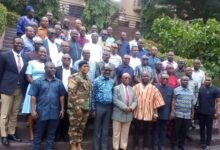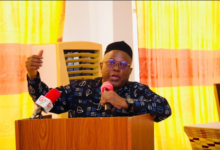Nii Osaman I swears oath to Gbese Stool in Accra

Nii Ayikwei Osaman I, the newly outdoored Abofu Mantse(chief) on Saturday swore his oath of allegiance to the Gbese Stool at the Gbese Mantse’s Palace, and was subsequently admitted to the Gbese Stool Council as a member.
The short ceremony performed early in the morning with all traditional norms and practices had many of the Council members, including chiefs from other settlements under Gbese and some of the principal elders present.
Nii Osaman swore the oath to the Gbese Mantse and Adonten of the Ga State, Nii Ayi- Bonte II in the presence of Nii Kasablofo V,Gbese Dzasetse( Principal Kingmaker),Nii Ayi Ardeyfio, Gbese Akwashontse(Chief of Defence Staff), Nii Larkai VII, Gbese Manhean Mantse and Atofotse and Mallam Issah, a Principal Elder from one of the major clans, Anerje We.
After the swearing of oath amidst drumming and firing of muskets to herald the end of every swearing, which were repeated three times for emphasis, the Abofu Mantse and together with his entourage were made to pass through the blood of a slaughtered white ram into the palace to signify their admission into the council.
Accompanying the Abofu Mantse were Naa Ayikaikor Odanta I, Abofu Manye, Nii Ayikai Gbetsorlor I, Abofu Shipi and Asafoiatse Nii Kwashie Fio II who were all admitted to the Council.
Taking turns to advise the new members of their responsibility as traditional duty bearers both to the Council and the people of Abofu, emphasis were placed on humility and servitude to the people.
Wrapping up the advises, Nii Ayi- Bonte asked them to consult broadly with stakeholders, before taking any major decision in order for the people to buy and participate in any development agenda.
He also reminded them that the oath was not an empty rhetoric since it was words of assurance to rule within the confines of traditional norms and practices, without which sanctions could be applied.
Nii Ayi-Bonte cautioned them that, in any administrative set up, there could be challenges, however as a leader, one needed to be fair and firm in coming out with judgment on any litigation after both sides had been given fair hearings.
BY LAWRENCE MARKWEI






